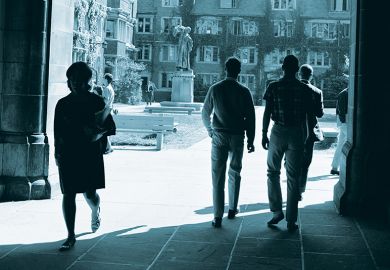The Biden administration has reportedly opened formal investigations into at least five elite US universities over legacy admissions, as part of a campaign to help improve diversity in higher education after the Supreme Court ban on affirmative action.
The investigations cover Harvard and Northwestern universities, plus the universities of Chicago, Notre Dame and Pennsylvania, focusing on their practice of giving children of alumni an advantage in admissions, according to Justin Gaffney Samuels, an activist who has pursued a range of rights cases against hundreds of institutions.
Harvard and Penn have acknowledged the cases publicly, with Harvard saying it was already taking steps to ensure all aspects of its admissions policies complied with the Supreme Court’s ruling last summer against affirmative action. The nation’s top court had long allowed racial considerations in admissions, then reversed that position after the Trump administration stocked it with a majority of conservative justices.
The Biden administration opposed that ruling, saying the Supreme Court ban would worsen an already difficult battle to achieve racial equity at leading US universities. Its education secretary, Miguel Cardona, then seized on a portion of the court’s ruling that suggested legacy admissions also should be confronted.
The Department of Education has the power to compel such changes through formal findings of civil rights violations that allow for corresponding financial penalties, but the extent of the administration’s commitment to using that route isn’t clear. The investigation against Harvard was prompted by a complaint led by Lawyers for Civil Rights, a Boston-based advocacy group. And Mr Samuels – a black film-maker and Cornell University graduate who sees an anti-male and anti-white bias in academia – is taking credit for complaints that led to the other four investigations.
Mr Samuels said he saw himself as a conservative ally of Edward Blum, the stockbroker-turned-activist who brought the affirmative action cases against Harvard and the University of North Carolina that led to last year’s Supreme Court rulings, but with a heavier focus on “anti-male sex discrimination”.
Legacy admissions are a problem, he said, because they “harm poor hardworking kids of all races”, while “giving college seats to the children of the wealthy who don’t need the degree as much or at all”.
All four of the institutions that Mr Samuels has accused of harmful legacy admissions policies are also among the 17 elite US institutions that were sued in 2022 for allegedly limiting their expenditures on low-income students by jointly setting the size of their aid packages. That case concerns a 1994 provision in federal law, now expired, that let the 17 universities jointly write their aid formulas as long as they admitted all their students without regard to their ability to pay.
Seven of them, including Chicago, have now settled the case, brought by a coalition of student plaintiffs, for a total amount exceeding $110 million (£85 million). The 10 others – including Penn, Notre Dame and Northwestern – are awaiting trial. The plaintiffs have put forth evidence that at least some of the institutions made admissions decisions based on the ability of their applicants to pay, and the others knew about that but still remained in the coalition.
Such developments were another major indicator that top-tier US universities are far more willing to accept racial diversity than the economic version, said Marybeth Gasman, professor of education at Rutgers, the State University of New Jersey.
“These institutions have educated the ‘elite’ for decades,” Professor Gasman said. “And despite diversifying in some ways, they still benefit from enrolling students from wealthy, highly educated families, because it results in money and connections.”
Register to continue
Why register?
- Registration is free and only takes a moment
- Once registered, you can read 3 articles a month
- Sign up for our newsletter
Subscribe
Or subscribe for unlimited access to:
- Unlimited access to news, views, insights & reviews
- Digital editions
- Digital access to THE’s university and college rankings analysis
Already registered or a current subscriber?








